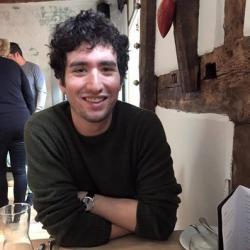Biography
I am a researcher at the Leverhulme Centre for Human Evolutionary Studies interested in understanding why communication is so complex across species, and how some aspects of communication are exploited, through mimicry or other tactics, for Darwinian purposes. Prior to my PhD, I worked as a postgraduate researcher in evolutionary biology at City University of New York, and more recently completed an ESRC-funded fellowship at the Institute of Global Health Innovation, Imperial College London, where I applied some elements of my research to the public health sphere. I hold a BA in Philosophy and Behavioural Biology from Emory University and an MA and MPhil in Philosophy (with focus on philosophy of science and evolutionary ethics) from the University of London. I am also a science writer.
Research
I am broadly interested in how ecological factors affect the evolution of signals and communication, and whether coevolutionary relationships between cooperative and competitive individuals across taxa have shaped the diversity of Darwinian strategies we see across species. In my PhD project, I aim to apply this thinking to human language, and to explore whether imitation of signals associated with cooperation is an important driver of linguistic complexity.
Publications
Popular articles:
Inner goblins. New Scientist. May 3, 2023.
Blue ticks: what evolutionary theory tells us about the turmoil around social media verification. The Conversation. March 7, 2023.
Psychopaths: why they’ve thrived through evolutionary history – and how that may change. The Conversation. February 13, 2023.
Beware the rise of corporate rituals designed to manipulate employees. New Scientist. July 20, 2022.
Learning to live with covid-19 means covering up coughs and sneezes. New Scientist. March 16, 2022.
Why we shouldn’t worry about COVID spilling back from animals into human populations. The Conversation. March 2, 2022.
Evolution of language can help us sift truth from lies in modern world. New Scientist. January 26, 2022.
How disease has stimulated cultural change. The Conversation. November 15, 2021.
We should isolate when we have flu, not just covid-19. New Scientist. September 15, 2021.
Sustainability and public health (with Carol Brayne). The Darwinian. August 2021.
The fight against coronavirus needs to embrace evolutionary theory. New Scientist. July 14, 2021.
COVID: did a delayed second dose give the delta variant an evolutionary helping hand? The Conversation. June 11, 2021.
Immune response might be more about signalling to others that you need help and less about protecting your body. The Conversation. May 12, 2021.
A pandemic like no other. New Scientist. January 9, 2021.
An evolving crisis. New Scientist. May 20, 2020.
Letter: Our nature’s political side is driving the polarising rhetoric of these times. Financial Times. April 17, 2020.
The challenge of finding genome-based cancer treatments. Scientific American. April 3, 2020.
Uighur Muslims: novel coronavirus could become increasingly virulent in detention camps (with Paul Ewald). The Conversation. February 19, 2020.
Where is the next HPV vaccine? Proto. January 15, 2020.
Welcome to the virosphere. New Scientist. January 8, 2020.
Citation counting is killing academic dissent. Times Higher Education. November 25, 2019.
How do we decide what is right? The ethicist’s view. Times Higher Education. March 28, 2019 (part of feature: The THE-Microsoft survey on AI).
Confused about cancer? New Scientist. February 4, 2019.
Fear over healthcare locks Americans in jobs – and throttles creativity. The Guardian. November 13, 2017.
If culture is too expensive for most, everyone pays a price. Aeon. December 2, 2016.
How statistics are twisted to obscure public understanding. Aeon. July 11, 2016.
The fight is a morality play. Aeon. July 8, 2015.
The myth of memes. Aeon. May 8, 2015.
Book reviews:
Our Tribal Future (David Samson). New Scientist. Forthcoming.
Why We Meditate (Daniel Goleman and Tsoknyi Rinpoche). New Scientist. January 18, 2023.
19 Ways of Looking at Consciousness (Patrick House). New Scientist. October 12, 2022.
Publications (from Symplectic)
2024
Doi: 10.1017/ehs.2024.36
Doi: 10.1017/dap.2024.74
2023
Doi: http://doi.org/10.1371/journal.pone.0289333
Doi: 10.1007/s10539-023-09936-8
2021
Doi: http://doi.org/10.1111/eva.13280
2019
Doi: 10.1016/s0262-4079(19)30245-3
Doi: http://doi.org/10.1136/bmj.l264
Doi: http://doi.org/10.3389/fonc.2019.01527
2014
Doi: 10.1111/zygo.12089
2023 (No publication date)
Doi: 10.17863/CAM.100182

